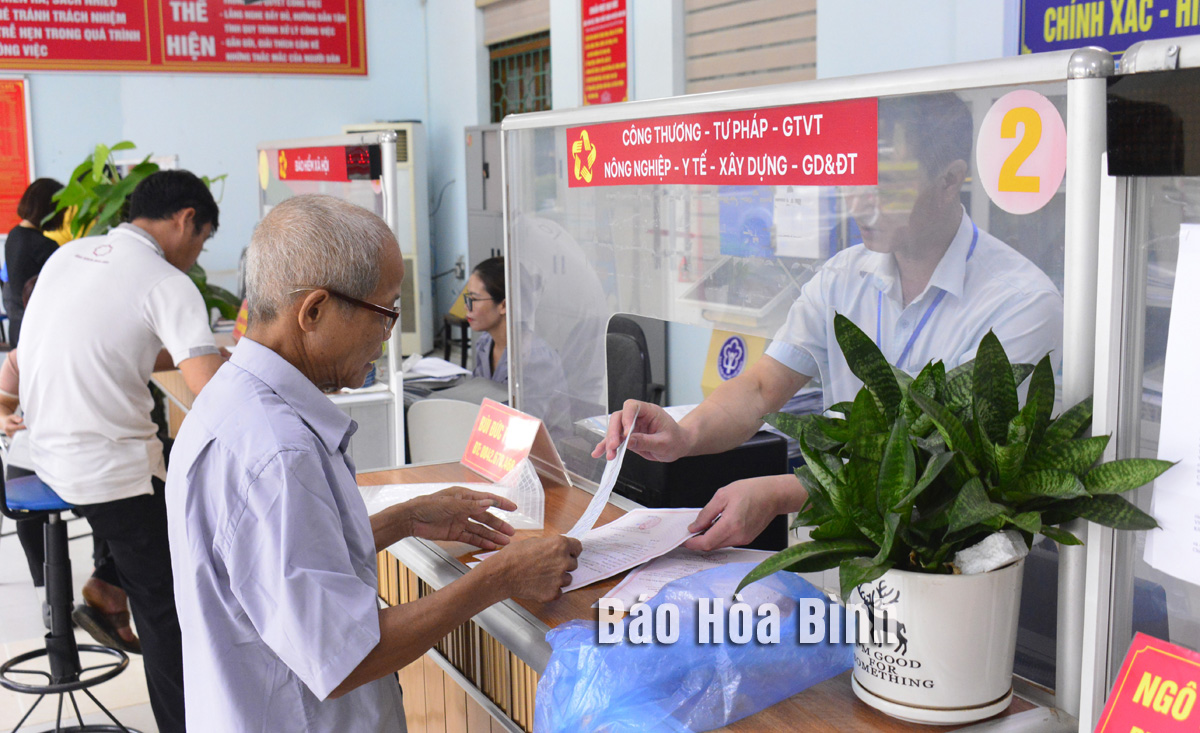
Kim Boi district has been actively implementing Resolution No. 18-NQ/TW, issued by the 12th Party Central Committee in 2017, which aims to streamline the political system for greater efficiency without disrupting operations.

Residents in Kim
Boi district carry out administrative transactions.
As one of the first localities to embark on this
reorganisation, Kim Boi expanded Bo town’s area and population in 2020 by
merging two neighbouring communes, Ha Bi and Kim Binh. Since then, Bo town has
stabilised its organisational apparatus and focused on leading the
implementation of political tasks.
The district has significantly reduced its
public sector workforce and administrative units. By November 30, 2024, the
number of public service units had been cut by 16 compared to 2017, and the
number of administrative units at the commune level was reduced to 17, down by
11. This restructuring also resulted in a reduction of 45 villages and 148
village part-time positions.
Despite the reorganisation, local government operations
remained smooth and uninterrupted. The simplified structure lowered staffing
costs, freeing up resources for development projects. By late 2024, the
district had resolved staff redundancies, reassigning or settling 218 surplus
commune-level officials.
On February 14, 2025, Kim Boi completed its
political system restructuring. The district’s Information and Education Board
and Mass Mobilisation Board were merged to become the district Information and
Education, and Mass Mobilisation Board. Several Party cells were dissolved,
established, or renamed to align with the new structure.
Kim Boi Party Committee Secretary Nguyen Hoang
Thu emphasised that while restructuring is essential for strengthening the
Party’s leadership, it requires unity, determination, and responsibility from
all officials and Party members.
The district is now focusing on implementing the
new organisational model and ensuring effective and unified operations across
all units.
Mai Chau district has firmly established itself as a standout destination on Vietnam’s tourism map, attracting both domestic and international visitors with its breathtaking landscapes, rich ethnic culture, and warm hospitality. However, beyond its natural and cultural charm, a secure and well-managed tourism environment has added to Mai Chau’s appeal.
As Vietnam enters a new phase of economic and administrative reform in 2025, Hoa Binh province is stepping up its efforts to streamline governance, boost economic growth, and attract investment.
The Hoa Binh provincial People's Committee held its monthly meeting on March 26 to review the progress of key projects, assess budget revenue and public investment disbursement, provide feedback on draft documents for submission to the provincial Party Committee's Standing Board, and discuss other important matters related to the committee's governance activities.
Playing a key role in Hoa Binh province’s economic development, Luong Son district has been focusing on science and technology development, innovation, and digital transformation.
Identifying the application of online public services as a key step in administrative procedure reform and e-government building, Kim Boi district has proactively provided services and supported residents and businesses in accessing and utilising full-process online public services promptly and efficiently. The locality aims to lift the rate of end-to-end online public services to over 90%, with all officials and civil servants handling tasks in the digital environment.
Nguyen Anh Tuyet, hailing from a family steeped in the ancient art of herbal medicine, is transforming local medicinal herbs into high-value concentrated extracts, elevating their worth and healing potential.



